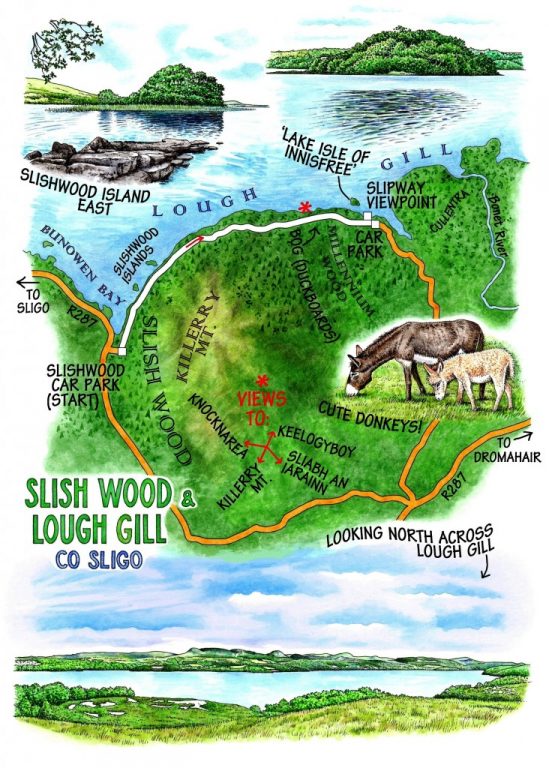 Slish Wood and Lough Gill, Co. Sligo
Slish Wood and Lough Gill, Co. Sligo
Lough Gill, calm and beautiful, fills the valley between the rugged mountains of Killerry and Keelogyboy a little east of Sligo town. The dragon-shaped lake is thickly wooded, especially along the south shore where ancient Slish Wood runs steeply down the lower slopes of Killerry to meet the water among big mossy boulders.
On this morning of sun and blue sky over Sligo – the first for weeks – Jane and I were lucky to have the company of Deirdre Kennedy, the energetic and highly effective Rural Recreation Officer for Sligo and Leitrim. It’s Deirdre and her dozen or so fellow RROs who juggle the budgets, the schemes, the practicalities and the hopes and fears of walkers, farmers and landowners into the ever-growing nationwide network of Waymarked Ways and Looped Walks.
Slish Wood looked beautiful today, the sunlight filtering down through glass-green beech leaves among the ash, oaks and tall Scots pine. Shaded by trees, the path ran along the lake shore, giving tantalising glimpses out between the boulders and loughs to the long upturned boat shape of Benbulben. The mountain’s scores of water-cut gullies fell vertically in deep shadow from the flat summit plateau, then angled outwards in a great green skirt to merge into the plain at the foot of the mountain.
‘You’d want to sleep the night out in Slish Wood,’ said Jane, ‘and wake up with the red squirrels and pine martens, and look out to see that view.’ That was the very notion that occurred to W.B. Yeats when, a moody teenager in his Uncle George Pollexfen’s house in the 1870s, he decided to mooch off and spend the night being pure and poetic in Slish Wood. When he got home the next day, pouchy-eyed and exhausted after a sleepless night, the saucy maid-servant couldn’t resist teasing the priggish young Dubliner. ‘She believed,’ wrote Yeats, ‘I had spent the night in a different fashion and had invented the excuse to deceive my uncle, and would say to my great embarrassment, for I was as prudish as an old maid, “And you had good right to be fatigued!”’
Soon the track left Slish Wood and climbed by duckboards and black peaty stretches over a soft green bog starred with golden bog asphodel. At the summit rocks we halted to take on board the view – the ‘Sleeping Warrior’ of Keelogyboy, his head and toes upturned beyond the lake, lumpy Killery at our backs, the button of Queen Medbh’s tomb on top of Knocknarea in the west, and out on the eastern skyline the long rising seal’s profile of Sliabh an Iarainn.
The track dipped down through Cullentra’s Millennium Wood (a tree planted for every household in Co. Sligo) and came through a field with a baby donkey (aaah! sweeet!) to the lake shore opposite white-faced Parke’s Castle. A couple of hundred yards out into the lough lay the round, tree-smothered islet of Inishfree – Yeats’s ‘Lake Isle of Innisfree’, inspiration for his best-known poem when he was a lonely expatriate in 1880s London. ‘While walking through Fleet Street, very homesick,’ Yeats reminisced in The Trembling of the Veil, ‘I heard a little tinkle of water and saw a fountain in a shop-window which balanced a little ball upon its jet, and began to remember lake water…’
The dream of peace and simplicity, the bean rows and the small cabin of clay and wattles in the bee-loud glade, ring a universal bell; and we all felt its tug, too, standing on the slipway and watching the royal blue lake lap the little isle.
WAY TO GO
MAP: OS of Ireland 1:50,000 Discovery 25; downloadable map/instructions at irishtrails.ie or sligowalks.ie.
GPS: satmap.com
TRAVEL: Leave Sligo on N4 Collooney road; R287 towards Dromahair; follow brown ‘Inishfree’ and ‘Cullentra’ signs to car park marked ‘Yeats Country Tour Location 8’, just before Inishfree slipway/viewpoint (OS ref G 770329). Leave one car here; return in other the way you came for about 11 km/7 miles. Just before sharp left bend on Bunowen Bay, marked with ‘caution – bend’ symbol, turn right (OS ref G 738314) into Slish Wood car park (brown forestry symbol; Coillte ‘Slishwood’ sign).
WALK DIRECTIONS: Facing R287, turn right along track beside lake. In 2 km/1¼ miles, keep left at ‘Forest Walk’ sign, following yellow arrows/walking man symbol beside lake, out of wood over boggy ground, down through Cullentra Wood to pass through 2 fields to a road (769329). Left to slipway and Inishfree viewpoint, return up road for 100m to car park.
LENGTH: 4.8 km/3 miles – allow 1½ hours
GRADE: Easy
CONDITIONS: Bog section can be sloppy after rain.
DON’T MISS:
• Superb views all round from highest part of bog section
• Slipway viewpoint to Lake Isle of Inishfree
• Cute donkeys in fields near slipway
REFRESHMENTS: Riverbank Inn, Dromahair (071-91-64934; riverbankrestaurant.ie) for lunch snacks; Eala Bhan Restaurant, Sligo (071-914-5823; ealabhan.ie) for an excellent dinner – old favourites (steak, surf ‘n’ turf) with plenty of style.
BEST PICNIC SPOT: Bog path summit, on the rocks.
ACCOMMODATION: Sligo Park Hotel, Sligo (071-919-0400; sligoparkhotel.com) – modern, comfortable and welcoming.
GUIDE BOOKLET: ‘Sligo Walking Guide’ from Sligo TIC (071-916-1201; sligo.ie; discoverireland.ie/Places-To-Go/Sligo); sligowalks.ie
WALKING in IRELAND: Walking tour operators, local walks including Discover Ireland’s National Loop Walks, walking festivals throughout Ireland: www.discoverireland.ie/walking and www.coillte.ie
This walk is based on http://www.discoverireland.ie/Activities-Adventure/slish-wood/14132
BOOK: Christopher’s book Walking in Ireland (Ebury Press) contains 50 of his favourite Irish Independent walks.
csomerville@independent.ie
Words: 993